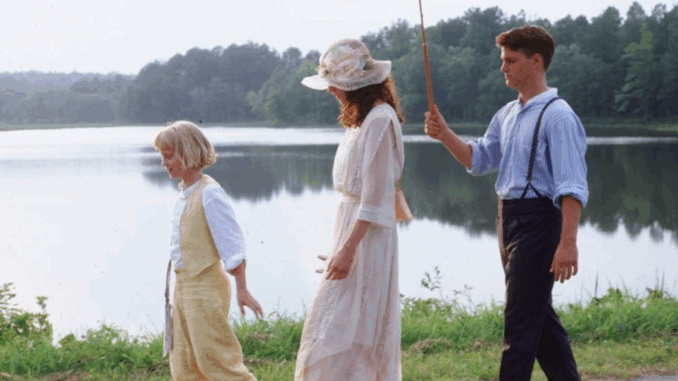
A Film That Ages Like Fine Wine
More than three decades have passed since Fried Green Tomatoes first graced the silver screen, yet its emotional gravity and storytelling finesse have never felt more relevant. Released in 1991 and based on Fannie Flagg’s novel Fried Green Tomatoes at the Whistle Stop Cafe, the film quickly became a beloved classic. In 2025, the movie continues to attract new viewers while still holding a firm grip on the hearts of longtime fans. But why does this particular Southern tale endure so powerfully?
A Story of Love, Loss, and Transformation
At its core, Fried Green Tomatoes is about transformation. Set across two timelines, the film follows the journey of Evelyn Couch (played by Kathy Bates), an unhappy, middle-aged housewife who finds new purpose after befriending the elderly Ninny Threadgoode (Jessica Tandy). As Ninny spins tales of the feisty Idgie Threadgoode (Mary Stuart Masterson) and gentle Ruth Jamison (Mary-Louise Parker), Evelyn begins to shed her insecurities and reclaim her life.
The dual narrative isn’t just a storytelling device—it’s a mirror. Idgie and Ruth’s bravery and defiance of societal norms echo into Evelyn’s world, encouraging her to rewrite her own story. It’s a theme that still speaks loudly in today’s world, where so many are navigating personal reinvention amid cultural pressure and expectation.
A Rare Depiction of Female Friendship and Queer Love

Fried Green Tomatoes broke quiet ground with its portrayal of deep female bonds. The relationship between Idgie and Ruth is presented with such tenderness and unspoken intimacy that many interpret it as romantic. In fact, Fannie Flagg’s original novel confirms their relationship was a lesbian romance. The film, though subtle due to the time of its release, still communicates this through lingering glances, shared silences, and deep devotion.
Today, with increasing demand for LGBTQ+ representation, this nuanced portrayal feels ahead of its time. The movie’s restraint might have been born of necessity in 1991, but viewers in 2025 often see it as a coded celebration of love that transcends labels.
The Timeless Charm of the Whistle Stop Café
Few movie locations are as memorable as the Whistle Stop Café, nestled along the railroad tracks of a sleepy Alabama town. The café is more than just a setting—it’s a symbol of community, resilience, and warmth. Fans have long sought out the real-life café in Juliette, Georgia, where the movie was filmed. Today, the Whistle Stop Café is still open and thriving, welcoming new generations of movie lovers who want to taste the famous fried green tomatoes and soak up the nostalgia.
In a fast-paced digital world, the café remains a grounding image of slower times, of shared meals, and stories told over coffee. It’s no wonder it still draws tourists and sentimental fans from around the globe.
Unforgettable Performances by a Stellar Cast
The film would not have achieved such staying power without the extraordinary performances of its cast. Kathy Bates’ transformation from timid housewife to empowered woman is both relatable and inspirational. Jessica Tandy brings warmth and wisdom to Ninny, making her stories feel like cherished memories. Mary Stuart Masterson and Mary-Louise Parker breathe life into Idgie and Ruth, infusing their friendship with heart and authenticity.
Even years later, these performances are celebrated not just as great acting, but as landmark portrayals of multi-dimensional female characters—a rarity then, and still notable today.
A Celebration of Southern Identity and Culture
Beyond the relationships, Fried Green Tomatoes is also a rich portrait of Southern life. From the small-town gossip to the mouthwatering food, and the deep sense of history and rootedness, the film captures a culture full of contradictions: kindness and cruelty, hospitality and harshness, tradition and rebellion. It neither romanticizes nor vilifies the South, but instead offers a loving, honest, and layered exploration.
This is especially poignant in 2025, as America continues to reexamine its regional identities, cultural divisions, and shared histories. Fried Green Tomatoes gently reminds us that even the smallest places can be home to the biggest stories.
Intergenerational Storytelling That Heals
At the heart of the film lies a powerful truth: stories heal. Ninny’s tales don’t just entertain—they transform Evelyn. The sharing of history across generations becomes a balm for wounds, a catalyst for change, and a tribute to lives once lived. This kind of intergenerational wisdom feels particularly urgent today, as society grapples with how to preserve traditions while embracing progress.
In 2025, many viewers find comfort in this dynamic, especially as they connect more with older family members or seek meaning in their own legacies.
A Legacy That Keeps Growing
The film has inspired everything from culinary pilgrimages to feminist studies classes. It has maintained a cult following and regularly appears on lists of the most beloved and influential women-led films. With streaming platforms giving it new life, younger audiences are discovering its charm for the first time.
Moreover, the themes of identity, choice, compassion, and the courage to defy expectations remain as powerful today as they were in 1991. Fried Green Tomatoes doesn’t just entertain—it enriches, empowers, and endures.
Conclusion: A Southern Classic for the Ages
Fried Green Tomatoes is more than just a film—it’s a deeply felt experience. Its ability to weave humor, heartbreak, social commentary, and personal transformation into one compelling narrative has solidified its place as a timeless classic. In 2025, it’s not just a movie you watch. It’s a story you live, remember, and return to—like home.
Whether you’re rewatching it for the tenth time or discovering it anew, one thing remains true: there’s something waiting for everyone at the Whistle Stop Café.
